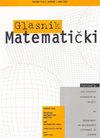有限整体商的双变微分演算
IF 0.5
4区 数学
Q3 MATHEMATICS
引用次数: 0
摘要
设(M,G)是一个有限整体商,即一个有限群G的作用的有限集合M。本文对弱Hopf代数k(G ω M)≃k[G ω M]上的所有双协变一阶微分演算(FODCs)进行分类,其中G ω M是与(M,G)相关联的作用群,k[G ω M]是G ω的群代数。具体地说,我们证明了k(G × M)上的FODC是双协变的一个充分必要条件,并证明了k(G × M)上的双协变FODC的同构类与某商空间的子集是一一对应的。本文章由计算机程序翻译,如有差异,请以英文原文为准。
Bicovariant differential calculi for finite global quotients
Let (M,G) be a finite global quotient, that is, a finite set M with an action by a finite group G. In this note, we classify all bicovariant first order differential calculi (FODCs) over the weak Hopf algebra k(G⋉M) ≃ k[G⋉M ], where G⋉M is the action groupoid associated to (M,G), and k[G ⋉M ] is the groupoid algebra of G ⋉ M . Specifically, we prove a necessary and sufficient condition for a FODC over k(G ⋉ M) to be bicovariant and then show that the isomorphism classes of bicovariant FODCs over k(G⋉M) are in one-to-one correspondence with subsets of a certain quotient space.
求助全文
通过发布文献求助,成功后即可免费获取论文全文。
去求助
来源期刊

Glasnik Matematicki
MATHEMATICS, APPLIED-MATHEMATICS
CiteScore
0.80
自引率
0.00%
发文量
11
审稿时长
>12 weeks
期刊介绍:
Glasnik Matematicki publishes original research papers from all fields of pure and applied mathematics. The journal is published semiannually, in June and in December.
 求助内容:
求助内容: 应助结果提醒方式:
应助结果提醒方式:


